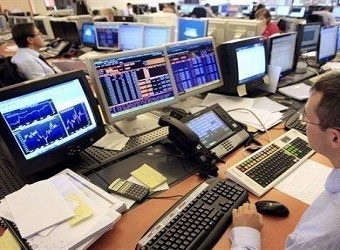European equities closed in the black on Monday, as positive trading on Wall Street and weakness in the euro, helping offset concerns surrounding the political instability in Germany.
The pan-European Stoxx 600 rallied in afternoon trade, closing up 0.67 percent provisionally, with almost all sectors finishing in positive territory.
The France’s CAC 40 and Germany’s DAX rose 0.40 and 0.50 percent respectively, while the U.K.’s FTSE 100 lagged behind, closing up 0.12 percent. In peripheral bourses, Switzerland’s SMI rose 1.26 percent, boosted by stocks such as Roche.
Autos was Europe’s top performing sector, closing up 1.33 percent overall, with German and French carmakers leading the way. Volkswagen rose 4.19 percent, after news emerged over the weekend that the manufacturer would invest 22.8 billion euros ($26.9 billion) in its main car brand over the course of 2018 to 2022. Porsche, which is owned by Volkswagen, popped 4.48 percent.
Health care stocks ended on a positive note Monday following news that President Donald Trump is not going to push for a repeal of Obamacare in a tax bill. The sector was also boosted by news that Roche successfully concluded trials against lung cancer. The stock jumped 5.87 percent on the news.
Media stocks posted solid gains with German broadcaster ProSiebenSat.1 leading the pack. Shares of the firm rose 3.22 percent, after news emerged that the broadcaster’s CEO, Thomas Ebeling, would be leaving the company in February.
On the other hand, insurance stocks struggled to post gains by the close — with financials also having come under pressure during trade — on growing doubts over U.S. plans to update the tax system. Despite the uncertainty, markets in the U.S. ticked higher by Europe’s close, as investors digested more individual stock news, while awaiting developments surrounding tax.
Looking at individual stocks, Altice jumped over 9 percent before paring gains to close up 5.2 percent on Monday — after denying market speculation that it was preparing to raise capital.
Elior Group, meanwhile, sunk to the bottom of the STOXX 600, tumbling 7 percent after Citigroup, Kepler Cheuvreux and Natixis cut their price targets on the stock.
The euro was trading lower against the yen, dollar and sterling at Europe’s market close (11:30 a.m. ET). The currency was under pressure following news that German Chancellor Angela Merkel failed to reach an agreement with two other political parties to form a new government. The FDP pulled out of the talks citing irreconcilable differences.
Merkel is now to consult with the German president on what to do next, but it’s possible that new elections could be called.
The collapse of the German coalition talks sent the energy group RWE higher. Investors believe that there are fewer chances that the Greens will join the next government and thus its plans to phase out coal power plants will be put on hold. The stock rose 2.75 percent.
In other news, oil prices came under severe pressure on Monday, with Brent off more than 1.5 percent by the market close, as investors were on edge ahead of an OPEC meeting due next week. Source: CNBC
Source: CNBC


